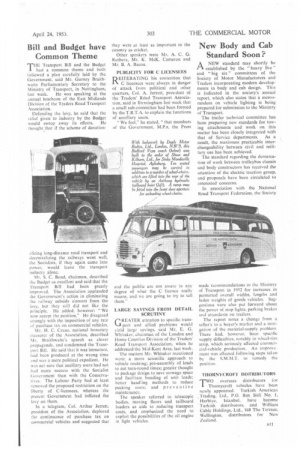Bill and Budget have Common Theme
Page 45

If you've noticed an error in this article please click here to report it so we can fix it.
THE Transport Bill and the Budget
had a common theme and both followed a plan carefully laid by the Government, said Mr. Gurney Braithwaite Parliamentary Secretary to the Ministry of Transport, in Nottingham, last week. He was speaking at the annual luncheon of the East Midlands Division of the Traders Road Transport Association.
Defending the levy, he said that the relief given to industry by the Budget would sweep away its effects. He thought that if the scheme of denation
tieing long-distance road transport and decentralizing the railways went well, the Socialists, if they again came into power, would leave the transport industry alone.
Mr. S. C Bond, chairman, described the Budget as excellent and said that the fransport Bill had been greatly improved. The Association applauded the Government's action in eliminating he railway subsidy element from the levy, but they still did not like the principle. He added, however: "We now accept the position." He disagreed strongly with the imposition of any rate of purchase tax on commercial vehicles.
Mr. H. C. Crane, national honorary treasurer of the Association, described Mr. Braithwaite's speech as clever propaganda. and condemned the Transport Bill. He said that it was immature, had been produced at the wrong time .ind was a mere political expedient. He was not sure that ancillary users had not had more success with the Socialist Government than with the Conservatives. The Labour Party had at least removed the proposed restriction on the liberty of C-licensees, whereas the present Government had inflicted the levy art them.
In a telegram, Col. Arthur Jerrett, president of. the Association, deplored the continuance of purchase tax on commercial vehicles and suggested that thcy were at least as important to the country as cricket.
Other speakers were Mr. A. C. G. Rothera, Mr. K. McK. Cameron and Mr. B. A. Bacon.
PUBLICITY FOR C LICENSEES D ElTERATING his contention that C licensees were always in danger of attack from political and other quarters, Col. A. Jerrctt, president of the Traders' Road Transport Association, said in Birmingham last week that a small sub-committee had been formed by the T.R.T.A. to explain the functions of ancillary users.
"We feel," he stated, "that members of the Government, M.P.s, the Press and the public are not aware in any degree of what the C licence really means, and we are going to try to tell them."
LARGE SAVINGS FROM DETAIL SCRUTINY
GBEATER attention to specific trans%,-,1 port and allied problems would yield large savings, said Mr. E. G. Whitaker, chairman of the London and I lome Counties Division of the Traders' Road Transport Association, when he addressed the Mid-Kent Area, last week.
The matters Mr. Whitaker mentioned were; a more scientific approach to vehicle routeing; pre-assembly of loads to cut turn-round times; greater thought to package design to save stowage space and facilitate bonding of unit loads; better handling methods to reduce packing costs; and preventive maintenance.
'The speaker referred to telescopic bodies, moving floors and tailboard loaders as aids to reducing transport costs, and emphasized the need to exploit the possibilities of the oil engine in light vehicles.




































































































